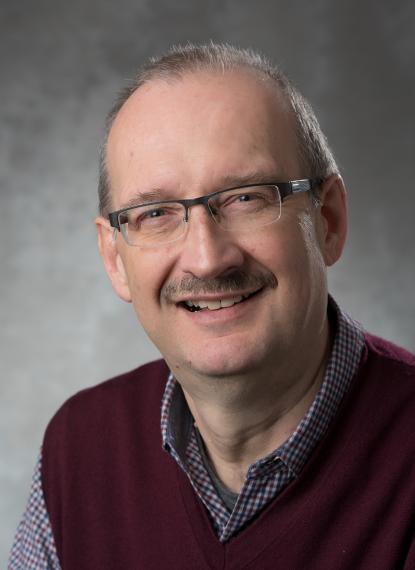Richard G. Zytner

Find Related People by Keyword
Education and Employment Background
Dr. Richard G. Zytner received his PhD from the University of Windsor in 1988. After a few years working as a Project Manager for Clayton Environmental Consultants, Ltd. Zytner joined the School of Engineering at the University of Guelph in 1991 where he is now a full professor. Zytner is a Professional Engineer of Ontario and a member of the International Water Association, the Canadian Society for Civil Engineering, and the German Association for Water, Wastewater and Waste.
Research Themes
Zytner’s research focuses on soil remediation technology, landfill gas management and wastewater treatment in the fresh-cut fruit and vegetable sector. His work emphasizes soil vapour extraction (SVE) and bioventing and includes laboratory and numerical modelling investigation of various contaminant transport parameters including mass transfer, biodegradation, and dispersion treatment of vegetable and fruit wash-water and residues. Zytner’s research has important applications for the grower and industrial processor. Key areas of focus include:
- Soil remediation. Zytner and his group explore SVE and bioventing to obtain a better understanding of the processes affecting both technologies with respect to the remediation of soil contaminated with petroleum hydrocarbons. Currently a primary objective is to determine scale-up factors for transferring bioventing laboratory results to the field. Experiments are being done in the lab with reactors holding either 200 g, 4 kg or 80 kg of soil to determine the degradation rate constant. Comparison of the rate constants allows calculation of the scale-up factors. A predictive correlation to estimate the degradation rate for a variety of soils has developed. Models representing SVE and bioventing processes in a three-dimensional setting are also being developed.
- Landfill Gas Management. Global warming is a major concern for society. Old landfills contribute via the fugitive emissions of methane, which has a global warming potential that is 36 times greater than carbon dioxide. Research is being conducted on a passive methane oxidation barrier that will treat fugitive methane emissions once the large biogas extraction systems reach end of life.
- Wastewater treatment. Here, Zytner focuses on the cost-effective treatment and disposal of vegetable and fruit biosolids and wash-water with the goal of water recycling. Projects involve various industrial partners for on-site treatment options. Ongoing research is reviewing what other jurisdictions are doing and completing a life cycle analysis (LCA) would provide additional information for the development of best management practices.
Highlights
- Natural Sciences and Engineering Research Council of Canada (NSERC) Alliance grant, 2019
- NSERC Discovery grant, 2019
- Ontario Ministry of Agriculture, Food and Rural Affairs (OMAFRA) grant, 2019
- Outstanding Associate Editor, Canadian Journal of Civil Engineering, 2017
- Fellow, Canadian Society of Civil Engineering, 2017
Media Coverage
Honors and Awards
- U of G News: Engineering Profession Honours Prof. Richard Zytner